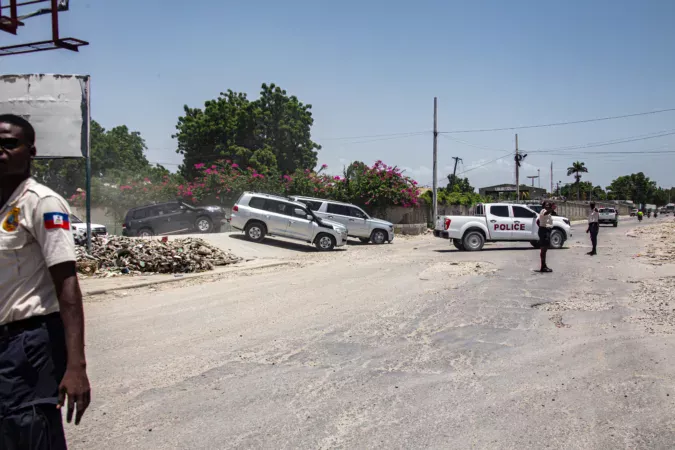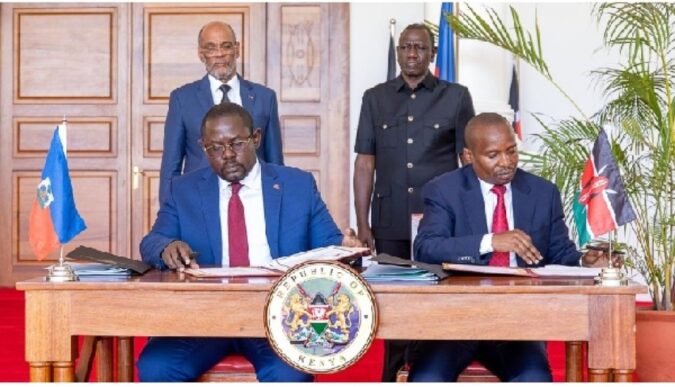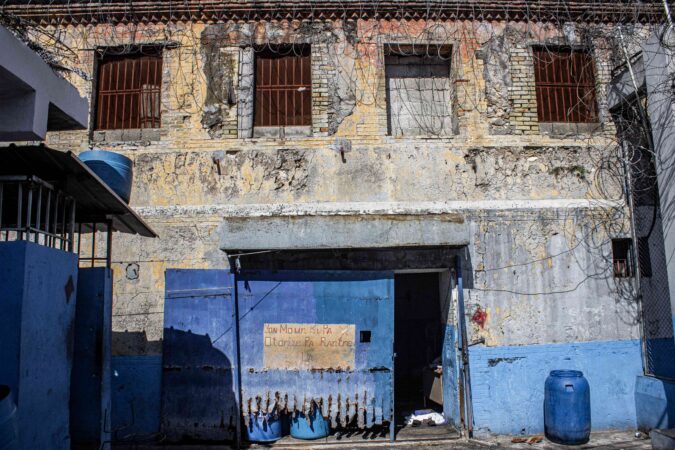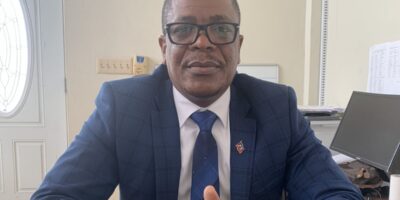Three constitutional law experts in Kenya warn against violations of Kenyan law in the approach of the two governments
Confusion and chaos reach a new level in Haiti this Friday where a multinational force led by Kenya is slow to intervene due to legal complexities and budget constraints, report actors familiar with the proceedings.
In this context of uncertainty, AyiboPost can confirm that the United States is requesting the resignation of Ariel Henry and the formation of a new government structure, according to a diplomatic source.
In front of the press, the American authorities deny putting pressure on the Prime Minister on March 6, 2024.
According to State Department spokesperson Matthew Miller, the US is pressing Henry to “accelerate the transition to a strengthened and inclusive governance structure that will act with urgency to help the country prepare for a multinational security support mission to address the security situation and pave the way for free and fair elections.”
Haitian and foreign actors are counting on the deployment of the foreign mission to pacify the country and lead it towards elections.

August 2023, PNH agents in the vicinity of Toussaint Louverture National Airport ensure traffic to facilitate the movement of the Kenyan delegation. | © David Lorens Mentor/AyiboPost
On March 1, 2024, the Haitian and Kenyan governments signed a non-public “Memorandum of Understanding”.
This Memorandum must address the legal and constitutional shortcomings mentioned by Judge Chacha Mwita to prohibit the deployment in an order issued in January 2023.
After the signing of this Memorandum, President William Ruto indicated in an official note that his country was ready to deploy police officers in Haiti.
An approach that some observers perceived as an attempt by the president to go against the decision of the court of justice which blocked the deployment of police officers.
Read also : La justice au Kenya bloque provisoirement le déploiement de sa police en Haïti
Three specialists in constitutional law in Kenya warn against violations of Kenyan law in the approach of the two authorities.
The first problem concerns sections 107 and 108 of the National Police Service Act.
Section 107 directs that any country practicing reciprocity must contain in its legislation “provisions similar” to that of Kenya.
“To have this reciprocal arrangement, the first condition is that the host country has a law regulating its police,” says Waikwa Wanyoike, a constitutional lawyer attached to the Nairobi High Court.
Even if this law exists, if there is no clear reference made in it about “foreign police deployment”, it is impossible to have a reciprocal arrangement.
And even if he refers to it, we must now see if this law is equivalent to that of the Kenyan police. Otherwise, again, it is impossible to have this reciprocal arrangement, according to the specialist.
“We have never been able to prove that Haiti respects the conditions for there to be a reciprocal arrangement with Kenya,” Waikwa Wanyoike told AyiboPost.
Read also : Le dossier haïtien montre une faille dans la Constitution kényane
Since the agreement is not public, it remains difficult to know what legal provision in Haiti it is based on.
But for the opponent and constitutionalist Ekuru Aukot: this “essentially political” agreement made at the instigation of the United States of America which “controls both President William Ruto and Prime Minister Ariel Henry” is “null and no avenue”.
The fact that de facto Prime Minister Ariel Henry combines the roles of president and prime minister at the same time “goes against the laws and the Constitution,” he thinks.
“So this is a person who does not have the capacity to engage the Republic of Haiti in an international treaty or a reciprocity agreement, whatever they want to call it,” says AuKot.

The Prime Minister of Haiti, Ariel Henry, and the President of Kenya, William Ruto, formalized on Friday, March 1, an agreement to send a security force to support the Haitian police. | © GHANAWEB
The publication of the terms of this agreement in the country’s official newspaper, Gazette, represents an essential step in making it official. This publication is still late, according to several Kenyan personalities interviewed by AyiboPost.
Following the United Nations Security Council resolution authorizing Kenya to lead the initiative in Haiti, President William Ruto, in an official correspondence dated October 3, 2023, promises that this mission will mark a new era in the history of international interventions in Haiti.
According to Aukot, the most influential political opponent in the fight against the landing of Kenyan police officers in Haiti, what the two leaders claim to sign as a reciprocity agreement is not in accordance with the orders of the Court, and remains illegal .
“The Court,” Aukot said, “was very clear that the Kenya National Security Council does not have jurisdictional authority over the police.”
What the two leaders purport to sign as a reciprocal agreement is not in accordance with the Court’s orders, and remains illegal.
Indeed, according to articles 240 (8), 149, 150 of the Kenyan Constitution, the national security council is only authorized to deploy defense forces – considered as armed – for regional or international missions.
Based on these provisions, Judge Enock Chacha Mwita, in his judgment delivered on January 26, 2024, judges any initiative to deploy the police outside the country unconstitutional and illegal.
Given that the procedure for the deployment of forces was not respected, the constitutional lawyer and partner of the Olao and Rai Advocates firm, Olao Victor, believes for his part that this agreement and everything that follows arrives halfway. of a poorly initiated process.
“President Ruto’s decision [to send police officers to Haiti] is not a final conclusion,” warns Olao Victor, taking into account the Kenyan legal system.
This decision cannot be taken unilaterally by the president’s office, continues Olao Victor, specialist in constitutional law.
Read also : Perspective | La nature de la mission qui interviendra en Haïti est ambigüe
The said resolution must come from the National Security Advisory Council (NSAC), adds Victor.
Made up of the highest government officials, this council is empowered to make decisions regarding the security of Kenyan citizens.
President Ruto’s decision [to send police officers to Haiti] is not a final conclusion.
Normally, the procedure should begin with this security council, headed by the President of the Republic. The order would be transmitted to parliament, which is then supposed to submit a motion to the cabinet secretary responsible for internal security.
The latter is also called upon to present the council’s motion to parliament with the Attorney General in order to elucidate the details and integrity of this special commitment.
However, “they only addressed parliament after seeing that the process was not moving forward,” explains Kenyan lawyer Olao Victor.
In October 2023, the deployment of a foreign force to support the police is authorized by the United Nations, of which Haiti is a member.
Read also : Retour sur 15 années d’échecs de l’ONU en Haïti
In some respects, this is an unprecedented mission in the history of United Nations response forces.
Indeed, in an article published on the AyiboPost website, international relations specialist Moïse Jean notes that the mission will work in complementarity or even under the leadership of the Haitian police. Then, it is up to Kenya and Haiti to define the operational and final objectives of the Mission.
However, “it is up to the Security Council to define the objectives of the mandate,” writes Moïse Jean.
“This vagueness surrounding the nature of this force can give rise to a disempowerment of the main actors in the event of failure or even its exploitation,” analyzed Moïse Jean for AyiboPost.
In some respects, this is an unprecedented mission in the history of United Nations response forces.
Two specialists in Haitian law, James Boyard and Caleb Deshomme, admit the legality of a direct intervention by the UN in Haiti, based on provisions of international law and the fact that the mission was authorized by a resolution of the nations -united.
For the force under discussion, they recall that most agreements signed with other states must legally go through the Haitian parliament.
But within the framework of this document signed between Haiti and Kenya, it is not yet possible to know whether it meets the conditions of an agreement, since it has not been made public.
However, if it is adopted in this form, the document will result in Parliamentary ratification.
However, the parliament has not existed for several years.
In this case, “ratification will only be possible in Haiti after the elections are held,” underlines James Boyard.
The Haitian government is banking heavily on the deployment of the multinational mission to guarantee the security conditions necessary for the holding of elections.
Since March 1, 2024, the country’s security climate has been in turmoil.
Read also : Récit d’une évasion spectaculaire au pénitencier national
In the capital, heavy gunfire is heard everywhere, pushing hundreds of people to leave their homes.
For now, thousands of prisoners, including notorious gang leaders, remain at large following spectacular escapes from the country’s two largest prisons located in Port au Prince and Croix des Bouquets.

View of the national penitentiary after the invasion of March 2, 2024 | Jean Feguens Regala/AyiboPost
By Jérôme Wendy Norestyl, Wethzer Piercin et Fenel Pélissier
Cover image : Ariel Henry et le président kényan William Ruto au fond, lors de la signature de l’accord en vue du déploiement de policiers kényans en Haïti. | © Presidential Communications Unit (PCU) | © Jean Feguens Regala/AyiboPost
Gardez contact avec AyiboPost via :
► Notre canal Telegram : cliquez ici
► Notre Channel WhatsApp : cliquez ici
► Notre Communauté WhatsApp : cliquez ici







Comments